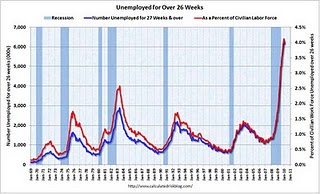Nobel-prize winning economist Paul Krugman had a hissy fit in his column the other day, charging Republicans in the Senate with both intellectual and moral turpitude — especially when it comes to the question of extended benefits for jobless Americans.
More than 6 million adults have been out of work for more than 26 weeks — that’s 4.0% of the civilian workforce (see graphic above) or 40% of the unemployed. To date, Congress has extended jobless benefits to this unfortunate cohort. That would seem to be the course of compassion. But the compassion may be misdirected, which brings me to this story of Krugmanesia.
From his perch in the much-mortgaged New York Times glass tower in midtown Manhattan, Krugman gives a lesson in economics while soundly rapping the knuckles of any who appear indifferent to the plight of the unemployed. Krugman extemporizes that those who support extending benefits (Democrats) live in one world while those who oppose extending benefits (Republicans) live in a Second Life-like world. Krugman lectures like the Princeton University professor he once was still is:
Take the question of helping the unemployed in the middle of a deep slump. What Democrats believe is what textbook economics says: that when the economy is deeply depressed, extending unemployment benefits not only helps those in need, it also reduces unemployment. That’s because the economy’s problem right now is lack of sufficient demand, and cash-strapped unemployed workers are likely to spend their benefits. In fact, the Congressional Budget Office says that aid to the unemployed is one of the most effective forms of economic stimulus, as measured by jobs created per dollar of outlay.
But that’s not how Republicans see it. Here’s what Senator Jon Kyl of Arizona, the second-ranking Republican in the Senate, had to say when defending… [Kentucky’s Sen. Jim] Bunning’s position (although not joining his blockade [to extend benefits]): unemployment relief “doesn’t create new jobs. In fact, if anything, continuing to pay people unemployment compensation is a disincentive for them to seek new work.”
via Op-Ed Columnist – Senator Bunning’s Universe – NYTimes.com.
The ever-curious James Taranto decided to investigate just exactly what classical economics textbooks say about benefits for the long-term unemployed. And here’s what he found in one popular economics textbook:
Public policy designed to help workers who lose their jobs can lead to structural unemployment as an unintended side effect. . . . In other countries, particularly in Europe, benefits are more generous and last longer. The drawback to this generosity is that it reduces a worker’s incentive to quickly find a new job. Generous unemployment benefits in some European countries are widely believed to be one of the main causes of “Eurosclerosis,” the persistent high unemployment that affects a number of European countries.
So those Second Life Seantors turn out to be quite up to snuff on economic theory. They might even be more than avatars when it comes to compassion. Of course, Krugman might dismiss this particular textbook; so many are laced with political bias. Not to worry. This particular tome, called Macroeconomics, was written by Paul Krugman and his wife Robin Wells.
It’s easy to make fun of economists — they are in the business of making predictions and models that often seem divorced from reality. It’s even easier to make fun of economists who contradict themselves on the basics. But in these extraordinary times we can’t afford to err on the side of generosity — or make dire missteps in rebuilding the labor force. No labor force, no real economic recovery. Period. In fact, consider these distressing facts: Transfer payments from the federal government now accounts for a record 18% of personal income in the U.S., says David Rosenberg, an economist few can mock (the worst you can say is that he’s a permabear). The outlays come at a time when monthly debt service for our national borrowings have touched $17 billion, or nearly 16% of monthly receipts, an alarming ratio.
Click here for Taranto’s podcast from his daily Best of the Web column. It’s worth hearing Taranto tell the story of Krugman and the two worlds of the cooked and the uncooked.
Graphic courtesy of Calculated Risk H/T Gregor Macdonald and MacroTwits for Treasury data

